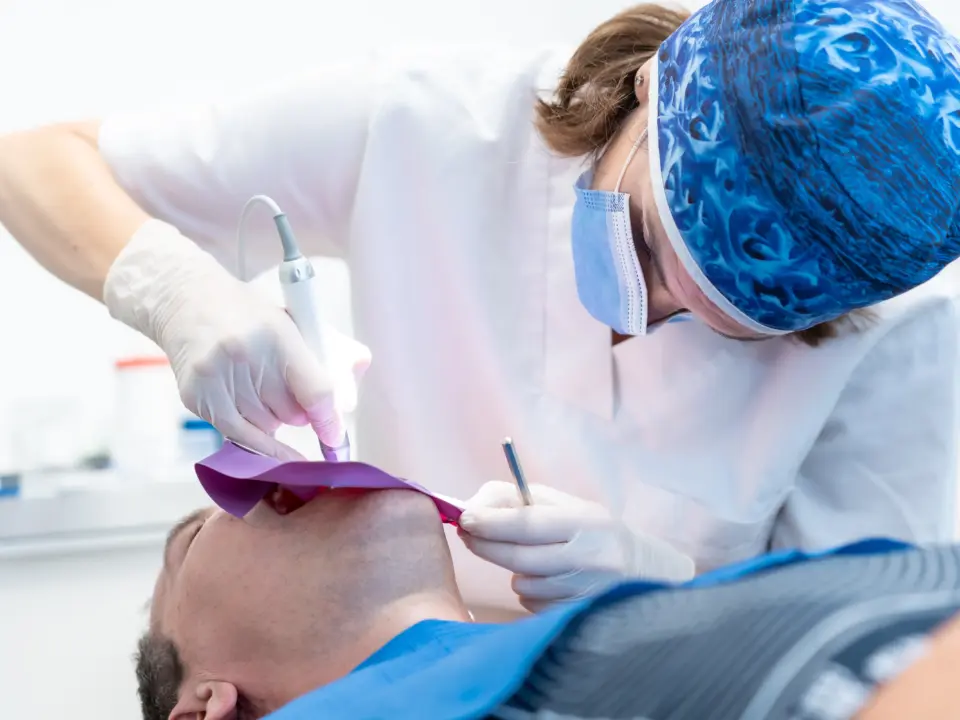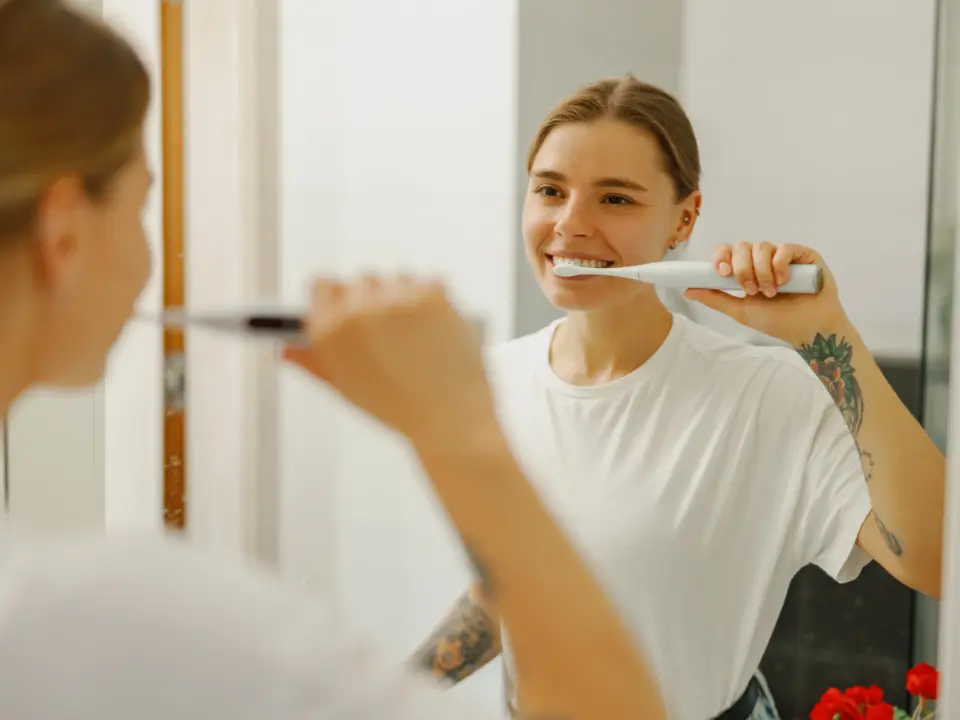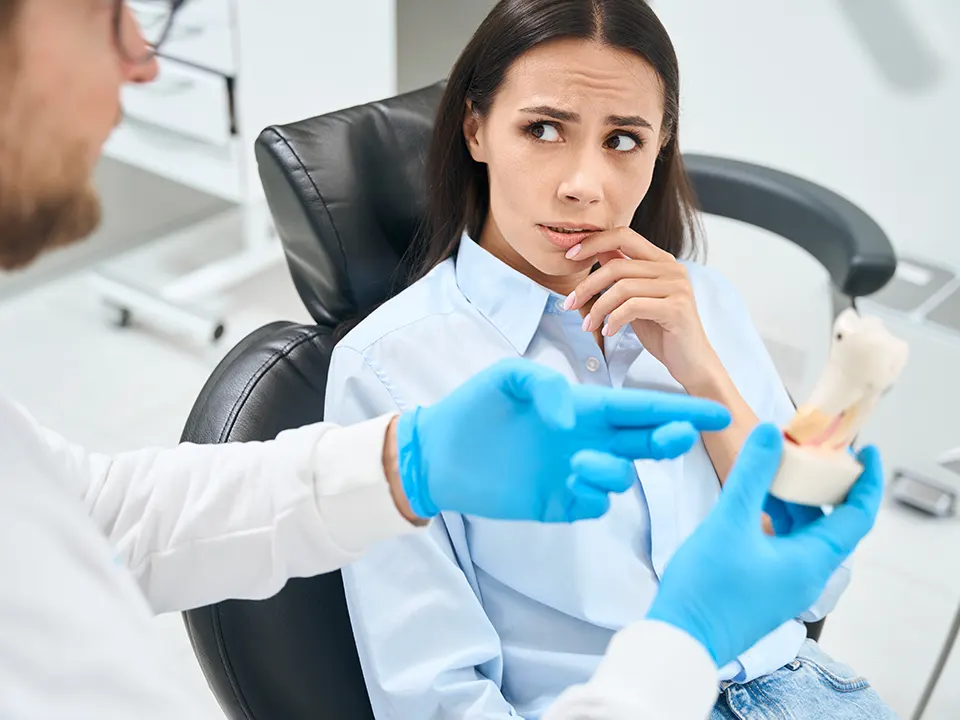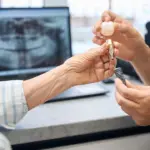
Understanding Tooth Replacement Options: Dental Implants
June 25, 2025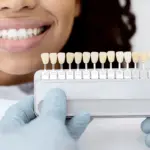
How to Get Whiter Teeth: Veneers vs. Teeth Whitening
August 22, 2025Snoring is one of those things that seems harmless at first. Sure, it might annoy your partner or wake you up now and then, but it’s easy to brush off. The truth is, regular snoring can be more than just noise. For some people, it can be a sign of a more serious condition called obstructive sleep apnea, or OSA.
Whether you’re dealing with loud nighttime rumbling or feeling tired every day, no matter how much sleep you get, there’s a good chance something deeper is going on. The good news is that there are simple and effective ways to fix it. One of those solutions is a custom dental device that helps you stop snoring and breathe easier through the night.
Why People Snore
Snoring happens when airflow gets blocked somewhere in your upper airway during sleep. This can be caused by the position of your tongue, a relaxed soft palate, or even extra tissues in the throat. When air tries to squeeze through, those tissues vibrate and create the sound of snoring.
There are a few common things that increase your chances of snoring:
- Nasal congestion or a blocked nasal passage
- Sleeping flat on your back
- Being overweight
- Drinking alcohol before bed
- Certain sleep positions
- A naturally narrow airway
Many people snore occasionally, especially when they have a cold or allergies. But for others, snoring is a nightly event that affects sleep quality and overall health.
When Snoring Is More Than Just Snoring
If snoring is combined with symptoms like choking, gasping, or feeling exhausted during the day, it could point to obstructive sleep apnea. This is a type of sleep disorder where the airway becomes blocked repeatedly during the night. Each time this happens, the brain briefly wakes the body up to breathe again, even if you don’t fully remember it.
Over time, this cycle can lead to serious health concerns, including high blood pressure, heart problems, weight gain, and memory issues. Signs you might have sleep apnea include:
- Loud snoring most nights
- Waking up suddenly, sometimes with a choking feeling
- Morning headaches or dry mouth
- Trouble concentrating or remembering things
- Feeling tired no matter how much you sleep
- Irritability or mood swings
If these symptoms sound familiar, a sleep evaluation might be worth looking into.
Diagnosing Sleep Apnea
To find out if your snoring is connected to sleep apnea, a sleep study is usually the next step. This can be done in a clinic or sometimes even from the comfort of your home with special equipment. During a sleep study, your breathing, oxygen levels, and movement are tracked throughout the night.
If the results show signs of sleep apnea, a physician will recommend the best course of treatment depending on the severity. This is an important step in figuring out what’s really going on and what kind of care will be most helpful.
Treatment Options: CPAP vs. Dental Devices
For moderate to severe cases of sleep apnea, many doctors recommend a continuous positive airway pressure machine, also known as CPAP. This device uses a mask and air pressure to keep your airway open during sleep. It works well, but not everyone finds it comfortable or convenient.
Some people have trouble adjusting to the mask, find the machine noisy, or don’t sleep well with it. If that sounds familiar, or if your diagnosis is mild to moderate, a custom dental appliance might be a better option.

What Is a Custom Dental Device?
A dental sleep device, also called an oral appliance, is a small, mouthguard-style tool that is worn during sleep. It works by gently repositioning the lower jaw to keep the airway open. This simple shift can make a big difference in your ability to breathe quietly and easily at night.
Compared to CPAP, a dental device is:
- Small and easy to travel with
- Silent, with no machine noise
- Comfortable and custom-fitted to your mouth
- Easy to clean and maintain
- Non-invasive, with no tubes or cords
For people who have trouble with CPAP or who are looking for something more low-key, this type of appliance can be a game changer.
Lifestyle Changes That Help You Stop Snoring
While devices and machines are helpful, a few lifestyle changes can also make a big difference when it comes to reducing snoring and improving sleep.
Sleep on your side
Lying on your back makes it easier for your tongue and soft tissues to block your airway. Try switching to your side. If you tend to roll over during sleep, try a pillow that supports side sleeping or sew a small object like a tennis ball into the back of your shirt to keep you from turning.
Avoid alcohol before bed
Drinking alcoholic beverages relaxes the muscles in your throat, which increases the chance of snoring. Try cutting back on alcohol, especially a few hours before bedtime.
Clear up nasal congestion
If your nasal passage is blocked because of allergies or a cold, you’re more likely to snore. Consider using nasal strips, a humidifier, or a saline rinse to improve airflow.
Keep a consistent sleep schedule
Going to bed and waking up at the same time every day helps your body stay in rhythm. Better sleep habits can lead to better sleep quality and less snoring.
Common Questions About Dental Devices and Sleep Apnea
Is a dental appliance better than CPAP?
It depends on your needs. CPAP is the most common treatment for moderate to severe sleep apnea. But for mild to moderate cases, or for people who can’t get used to CPAP, a dental device is a great option.
How long does it take to get used to a dental device?
Most people get used to wearing it within a few nights. Because it’s custom-made to fit your mouth, it’s designed to be comfortable and easy to wear.
Are store-bought snoring devices the same?
No. Over-the-counter devices are not custom-fitted and may not work properly. A professional oral appliance is made to match your bite and jaw position for safe and effective results.
Can snoring be completely cured?
That depends on the cause. For many people, a combination of dental treatment and healthy habits can significantly reduce or even eliminate snoring.
Getting Help for Snoring and Sleep Apnea
If you’re ready to stop snoring, sleep better, and feel more rested during the day, it might be time to start exploring your options.
At Knox Mountain Dentistry, we work with patients to find the right solution. If you’ve been struggling with snoring or think you might have sleep apnea, we’re here to help. We can guide you through the screening process, help arrange a referral to a local sleep clinic, and fit you with a custom dental appliance if it’s right for you.
Book a consultation today and take the first step toward better sleep and better health.

